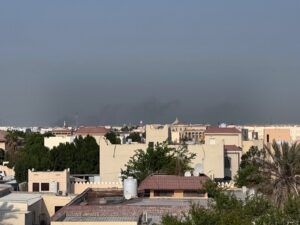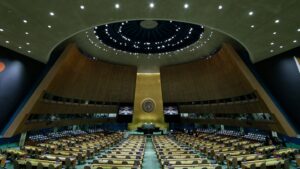
The National Interest Foundation Newsletter
Issue 301, September 12, 2025
Welcome to our NIF Newsletter. In this week’s edition, we examine how Israel’s reckless Doha attack violates Qatar’s sovereignty and proves it has no intent on reaching a Gaza ceasefire and hostage release deal, while also looking into the United States denying visa entry for Palestinian President Mahmoud Abbas and 80 members of his delegation in violation of the U.S. agreement with the United Nations.
Editor: Bassam Tarbush
Israel’s Reckless Doha Attack Violates Qatar’s Sovereignty and Proves It Has No Intent on Reaching a Gaza Ceasefire and Hostage Release Deal

There has been universal outrage over Israel’s attack on Qatar. (Photo from Getty Images)
Israel is facing yet another wave of worldwide denunciation following its reprehensible attack on Qatar earlier this week. The airstrike which targeted a residential area that houses foreign embassies in the capital city of Doha was not only a deplorable violation of Qatar’s sovereignty and norms of international law, but it also affirms that the Netanyahu government has no intention on reaching a ceasefire agreement in Gaza. Throughout the course of the ongoing conflict in Gaza, Qatar has served as the hub of regional mediation efforts and as one of the chief negotiators and intermediaries, using its diplomatic channels with Israel, Hamas, the United States, and others to facilitate countless rounds of talks. As such, the Israeli attack aimed at assassinating negotiators who were meeting to discuss a ceasefire proposal to bring the war to an end demonstrates a complete disregard for diplomacy and a clear desire to instead sabotage peace talks, perpetuate conflict, and initiate further destabilization in the region. Analysts also point to how the attack on Qatar highlights Israel’s increasingly reckless and criminal behavior as a rogue state.
The attack marked a new red line crossed by Israel, with many observers lamenting that a failure to hold the Netanyahu government accountable for its repeated transgressions has emboldened more and more egregious violations like this. The recent attempt to assassinate negotiators in the capital city of a major U.S. ally cannot be labeled as anything other than the actions of an outlaw state that is continuously displaying it is uninterested in peace and stability. As one commentator remarked, for anyone who doubted Netanyahu’s commitment to destructively prolonging the Gaza War, this latest attack should remove any uncertainty. The current Israeli government has persistently violated and ignored international law during its assault on Gaza while also attacking neighboring countries and seeking to fuel further instability and violence. In the absence of concrete punitive measures, particularly from those like the United States who possess the means to stop these repeated Israeli violations, they are likely to continue taking place. Some have also found it hard to believe that the U.S. did not know about the planned Israeli attack on Qatar, and as a result, have wondered if President Trump gave a green light for it. Back in late June, American air defense systems and anti-aircraft weapons were activated to counter an Iranian missile attack on the Al Udeid Air Base in Qatar which was carried out in retaliation for the bombings of several Iranian nuclear sites. The fact that this was not the case during the recent Israeli attack has further fueled speculation that the U.S. may have known about the strike and deliberately failed to thwart it.
The Israeli attack on Qatar has shown the lengths that the Netanyahu government is willing to go in order to derail Gaza ceasefire efforts. Over the course of the now 23-month long conflict, Netanyahu has repeatedly subverted and sabotaged negotiations – driven by political motivations and self-preservation. He has prolonged the conflict knowing full well that his political survival is intrinsically linked to the continuation of the war due to criminal corruption charges and being beholden to extremists who would otherwise collapse the coalition government. In their response to the attack, Qatari officials even accused Netanyahu of “wasting time” in the negotiation process and acting in bad faith, while describing the strike in the midst of ongoing talks as a form of state terrorism that was aimed at undermining any chance of peace in Gaza. The attack is made even more appalling considering that multiple international entities – including the United States – have supported Qatar’s hosting of a Hamas political office to enable channels of communication and mediation efforts. Thus, Israel decided to carry this out in spite of Qatar’s accepted and understood role as an intermediary. All of this raises serious questions as to how ceasefire talks can possibly continue, with one Qatari official understandably commenting that “When one party chooses to bomb the mediator and one of the negotiating delegations, what kind of talks can be considered valid?”
The United Nations Security Council condemned the Israeli attack in a statement that was unanimously agreed upon by all 15 members, including the United States. U.S. Ambassador to the United Nations Dorothy Shea issued remarks echoing those from Trump administration officials days earlier in the aftermath of the attack, stating that “Unilateral bombing inside Qatar, a sovereign nation working very hard and bravely taking risks alongside the United States to broker peace, does not advance Israel’s or America’s goals.” Other UN ambassadors noted Israel’s pattern of reckless and bellicose behavior, citing its attacks against Syria, Lebanon, and Yemen as the conduct of an extremist government emboldened by impunity. Even as the entire international community rebukes Israel for its illegal and outrageous attack on Qatar, Netanyahu has shamelessly suggested that he might order another attack despite Trump demanding a commitment that he not strike Qatar again. Ultimately, it is the lack of tangible punitive actions that go beyond occasional words of criticism that have created an environment which has allowed Israel to repeatedly commit these types of heinous violations.
United States Denies Visa Entry for Palestinian President Abbas and 80 Members of His Delegation in Violation of the U.S. Agreement with the United Nations

The State Department under the Trump administration’s decision to block the visas has been widely condemned by the European Union and others. (Photo from Getty Images)
The Trump administration’s move in recent weeks to deny visa entry to Palestinian President Mahmoud Abbas and around 80 other officials from the Palestinian Authority has prompted an array of criticism. Observers have been quick to point out that the decision violates international obligations and the United States’ longstanding commitment as a host country of the United Nations (UN) to allow delegates access to the UN General Assembly. Under the terms of the 1947 Headquarters Agreement, the U.S. is required to facilitate access for all accredited foreign delegates to the UN. Thus, legal experts and many global leaders have referenced how barring Palestinian officials including Abbas from attending the UN General Assembly meetings in New York is a direct breach of the agreement – and in turn, international law and the core principles of the UN. It also prevents Palestinian officials from exercising the right to make their voice heard at what are intended to be universal diplomatic forums like the United Nations.
In response to the visa denials, the European Union (EU) called on the State Department to reconsider its decision, with top EU officials urging the U.S. to uphold existing agreements between it and the UN. Other European leaders, including ones from France and Spain, relayed similar sentiments as well. They emphasized that access to neutral spaces dedicated to the promotion of peace such as the UN headquarters should not be restricted and that Palestinian delegates have the right to attend and speak at international diplomatic forums. Obstructing their ability to do so is a blatant violation of international law and the aforementioned UN Headquarters Agreement given that the latter stipulates entry cannot be denied to officials invited to attend UN sessions. Additionally, it undermines the UN’s purpose as a means of bringing all nation states together irrespective of any potential politicized factors or considerations. Regrettably, the U.S. has a history of violating their agreement with the UN, as this is not the first time that this type of action has been initiated against Palestinian officials. In 1988, the United States under the Reagan administration denied then Chairman of the Palestine Liberation Organization (PLO) Yasser Arafat an entry visa to address the UN General Assembly in New York. This sparked universal criticism and prompted the UN General Assembly to vote to move its session from New York to Geneva so that Arafat could address it. The decision to relocate served as a major rebuke to the Reagan administration’s unlawful action.
In this latest instance, there are clearly cynical motivations behind the move to block Palestinian officials from attending the UN General Assembly. The decision is intentionally timed to disrupt the international momentum and push for increased Palestinian statehood recognition, as a plethora of further countries including France, Australia, Belgium, Canada, and the United Kingdom have recently expressed plans for this. Israeli officials are believed to have encouraged their American counterparts under the Trump administration to deny visas for the Palestinian delegation in meetings prior to the action being initiated. The goal of those backing this is undoubtedly to hinder the Palestinian liberation movement on the international stage. All of this comes amid growing global condemnation of Israel’s repeated war crimes and human rights violations in both Gaza and the occupied West Bank – which have prompted the new wave of calls for the recognition of Palestinian statehood. An international summit regarding this issue, co-chaired by France and Saudi Arabia, is slated to take place later this month in September.
The decision to deny visa entries for the Palestinian delegation is dangerous. Analysts have labeled it as illegal interference with the norms and established rules of diplomatic engagement and international law. Israel’s widely criticized conduct has organically led to its increased international diplomatic isolation, and therefore, the Trump administration’s measures to shield Israel from the ramifications of this are unjust.
